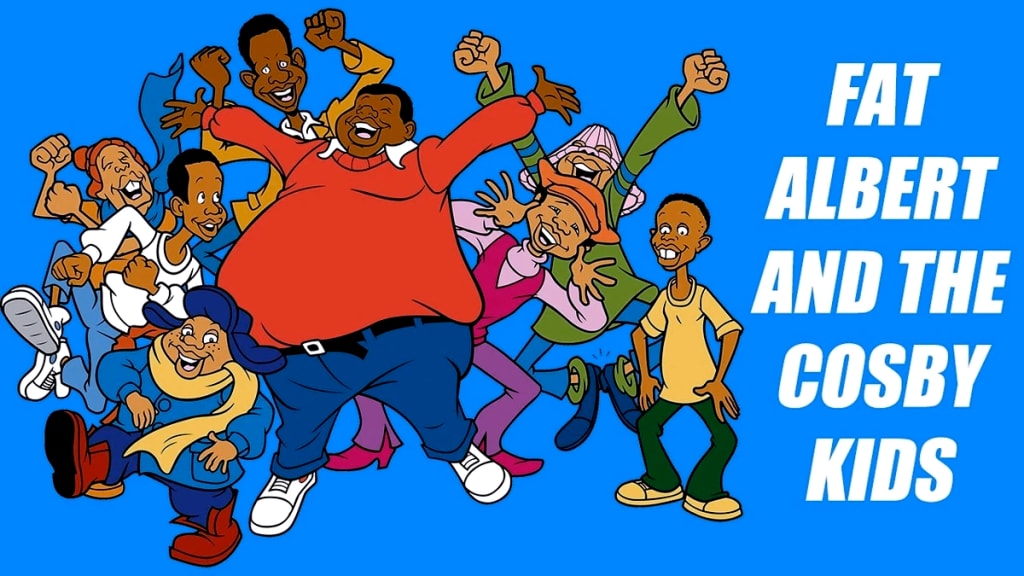Fat Albert Characters and the Cosby Kids
Fat Albert and the Cosby Kids

Fat Albert Characters and the Cosby Kids
"Fat Albert and the Cosby Kids" is an animated television series that aired from 1972 until 1985. Bill Cosby created the sitcom, which was based on his own childhood memories growing up in a Philadelphia ghetto. Fat Albert, a huge and kind-hearted youth who frequently served as a mentor and role model to his pals, is the primary character in the series, which follows the exploits of a group of young friends.
"Fat Albert and the Cosby Kids" is a beloved animated series that addressed important social issues such as racism, drug misuse, and peer pressure while also imparting valuable lessons on friendship, community, and personal responsibility. Its approachable characters, which spoke to people of all ages and backgrounds, were commended for their positive portrayal of African-American culture.
Despite being somewhat controversial due to its creator's criminal convictions, the show has remained a cultural touchstone and a favorite childhood memory for many, inspiring spin-offs, merchandise, and even a live-action film adaptation.
Who's Who Among Fat Albert and the Cosby Kids?
"Fat Albert and the Cosby Kids'" characters are a big part of what made the show so distinctive and beloved. Each character had an own personality and set of characteristics, and they created a close-knit group of pals that negotiated the ups and downs of growing up in a metropolitan neighborhood. Here's a summary of some of the prominent characters and their distinguishing characteristics:
- Fat Albert: The title character was a gentle giant with a golden heart. He was very concerned about his friends and frequently served as a mediator during confrontations.
- Rudy: Rudy was well-known for his cheeky personality and love of junk food. He was constantly devising new schemes and pranks to play on his friends.
- Mushmouth spoke in a jumbled manner that was difficult for others to understand. He was a fan favorite and was frequently the source of comedy on the show.
- Dumb Donald: Dumb Donald donned a hat that concealed his entire face, adding to his cryptic and mysterious demeanor. He was a quieter character, but he was always there for the gang when they needed him.
- Weird Harold was known for his large apparel, which contributed to his humorous appearance. He was a devoted friend who was always willing to assist his peers.
These individuals, along with a few others, comprised the show's core group of pals. They were all relatable and represented various aspects of growing up in an urban environment. The creators of the program did an amazing job of creating each character and making them feel real rather than caricatures. It's no surprise that audiences fell in love with them and still remember them warmly today.
Fat Albert and the Cosby Kids" on Popular Culture and Society
The influence of "Fat Albert and the Cosby Kids" on popular culture and society is substantial and long-lasting. The show was one of the first animated series to include a mostly African-American cast of characters, and it provided television with a much-needed portrayal of Black culture. Here are some of the ways the show left an impression:
- Positive portrayal: "Fat Albert and the Cosby Kids" presented positive representation of African-American culture and community at a period when such representation was unusual in the media. The show showed the characters as bright, kind, and industrious persons who confronted and overcame obstacles.
- Tackling social concerns: The show addressed serious social topics such as racism, drug misuse, and peer pressure in a way that young people could understand. Its goal was to educate and inform people while entertaining them.
- Influence on animation: "Fat Albert and the Cosby Kids" influenced other animated shows to have more varied casts of characters and to address social issues. The show's distinct animation style and usage of live-action portions distinguished it from other animated series of the time.
- Merchandise and spin-offs: The show's popularity resulted in a slew of merchandise, including comic books, toys, and clothing. The show has spawned spin-offs, such as the 1980s' "The New Fat Albert Show."
Overall, "Fat Albert and the Cosby Kids" had a huge impact on popular culture and society by portraying African-American culture and community positively and addressing key social concerns in an approachable manner. The show's continued popularity attests to its influence and significance in the history of animated television.
About the Creator
mohammed iguelim
Iguelim is a talented young writer who was born on 2001 in Morocco. From a very young age, Iguelim had a passion for storytelling and creative writing, which continued to grow throughout their childhood and teenage years.






Comments
There are no comments for this story
Be the first to respond and start the conversation.